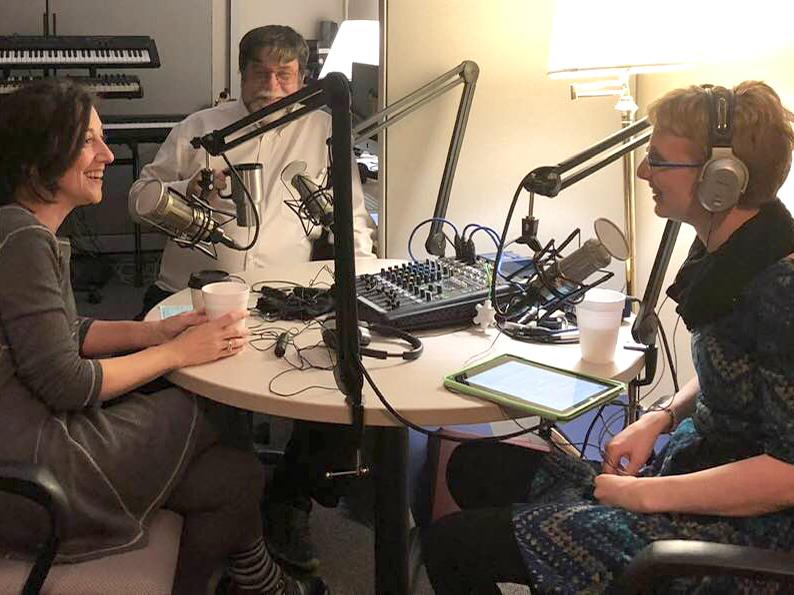Sharing knowledge -- Tea for Teaching podcast hosts John Kane (center) and Rebecca Mushtare (right) have a discussion with open pedagogy expert Robin DeRosa, director of the Open Learning and Teaching Collaborative at Plymouth State University. The podcast released its 100th episode on September 25, 2019.
The Tea for Teaching podcast, created and co-hosted by John Kane and Rebecca Mushtare from the college’s Center for Excellence in Learning and Teaching (CELT), released the 100th podcast in its weekly series this week with a retrospective and lessons learned. It’s the latest chapter in a successful project that has continued to grow an audience in Oswego and even around the world.
The hosts said they began listening to podcasts regularly in 2017, and saw it as a way to solve a challenge in their roles with CELT’s professional development offerings.
“There is not one ideal time to offer professional development workshops that will work for everyone synchronously, so the podcast was an exploration in how to offer professional development with experts in the field in an asynchronous way,” said Mushtare, who is also an associate professor of art.
“Many commuting and part-time faculty found it difficult to attend workshops and we had been exploring a variety of solutions,” said Kane, who is also a professor of economics. “We have recorded hundreds of workshops, but busy faculty and commuting faculty often found it difficult to find time to sit at a computer or mobile device and watch a recording.”
Since audiences can listen to podcasts while driving, exercising, working around the house and other ways, “this seemed like a good way to provide professional development resources to faculty that were not able to connect with us as easily in other ways,” Kane added.
The podcast debuted on Nov. 1, 2017, with the inaugural guest of chemistry faculty member Casey Raymond discussing “Digital Note Taking and Pencasting.” The shows follow a format that includes introductions, participants discussing which tea they are drinking during the show and then a friendly and engaging interview on an area of expertise for the guest related to teaching and learning.
“We have had downloads in over 100 countries and in all 50 states. The audience has been growing quite steadily and we're now getting thousands of downloads every month,” Kane said.
The feedback has been positive, from Oswego faculty, colleagues at other colleges and even people they don’t know but at conferences.
“I’ve been surprised in conversations with people on campus or at conferences who I have not met before who have listened and feel like they know a little bit about me (they know my voice, my tea choices, etc.) and are ready to engage in dialogue about material in the podcast,” Mushtare said.
Kane said this happens to him as well. “People listening to podcasts develop a sense of familiarity with the hosts since they often spend many hours listening to them,” he noted.
Showcasing Oswego
“One really nice aspect of this growing audience is that it lets us showcase some of the very impressive work done by Oswego faculty along with the work of internationally recognized experts,” Kane said. “Directors of teaching centers and online learning centers at many institutions have told us that they routinely share podcasts on their campus.”
The hosts have been delighted to interact with so many experts willing to generously share their time and knowledge.
“I think we’ve both been surprised at how many people have been willing to sit down and talk to us about the research they are doing so that we can share it with all of you,” Mushtare said.
“In our first 100 episodes, we had a wonderful opportunity to talk with researchers, innovators and experts who are exploring ways of more effectively helping students to be successful,” Kane said. “I’ve made many changes in my own classes based on these conversations. When we offer workshops, we interact with quite a few faculty in groups and learn a little about what they are doing. In a podcast, though, we get to explore topics in much greater depth.”
Mushtare also said her classes continue to evolve based on what she learns via their podcasting, and since they often record weeks in advance of release, she has time to explore concepts and techniques to use in her classes and introduce to other faculty.
In addition to providing others with professional development, Mushtare said it has been an enjoyable experience that benefited her as well.
“It has been a privilege to get to know some of our own faculty and their work -- it has allowed me to connect with faculty across our campus and across disciplines,” Mushtare said. “It has also been a really great way to push me to stay more on top of current writing and research on teaching and learning and to explore this information with experts conducting that research both on and off campus.”
New Tea for Teaching podcasts are available every Wednesday morning from their podcasting site, TeaForTeaching.com.




